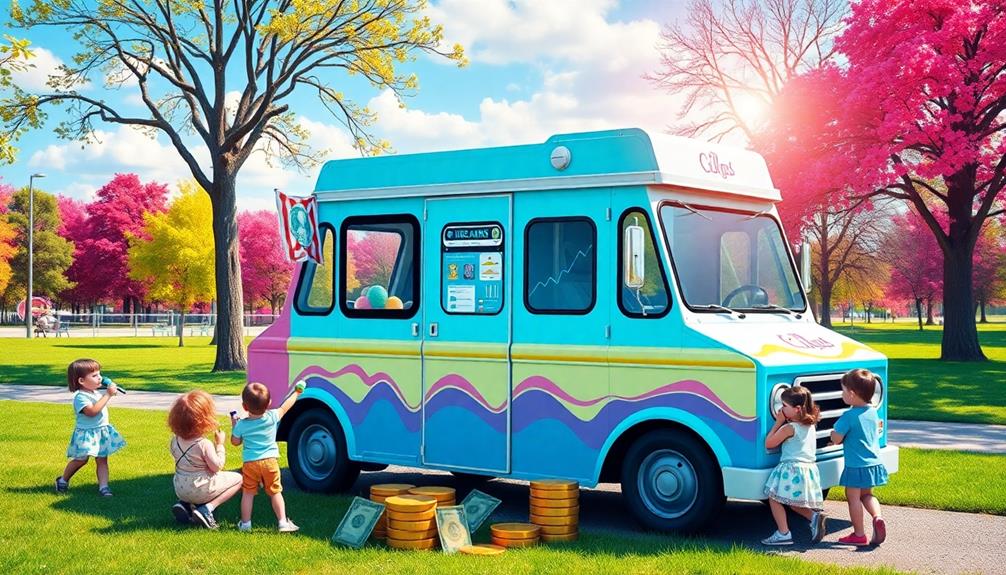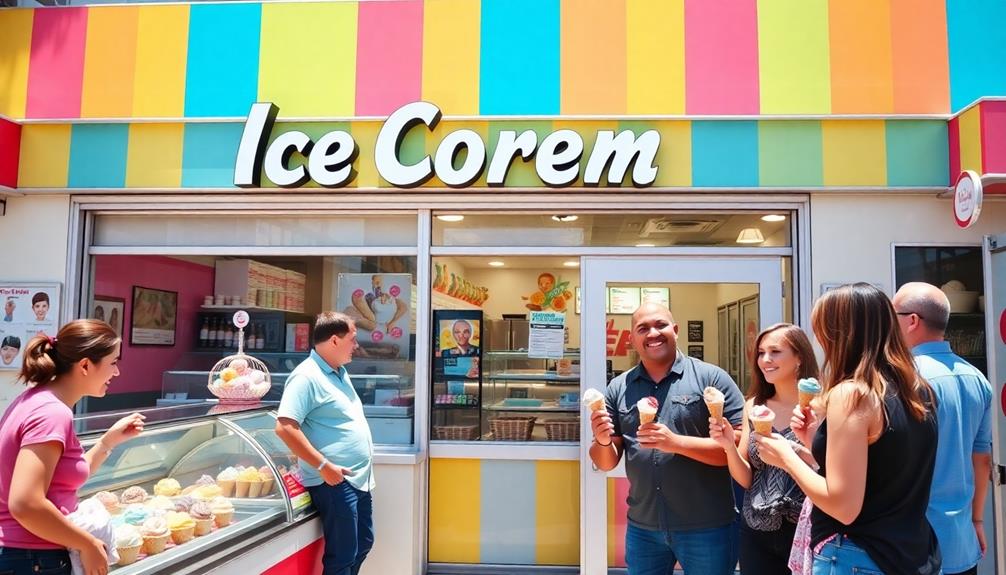Running an ice cream truck can be a rewarding venture, but it's vital to manage both the costs and earnings wisely. You'll need to invest between $50,000 and $150,000 initially for the truck, equipment, and permits. Monthly expenses typically hover around $2,500, covering fuel, maintenance, and inventory. During peak season, daily earnings can reach $300 or more, especially at events. Effective marketing and route optimization are important to boost sales, while catering gigs can greatly increase income. If you're curious about how to make the most profit from your ice cream truck, there's much more to explore.
Key Takeaways
- Ice cream trucks typically earn between $10,000 and $15,000 annually, with daily earnings ranging from $200 to $300.
- Initial investment costs can range from $50,000 to $150,000, covering trucks, inventory, and equipment.
- Monthly expenses average around $2,500, including fuel, maintenance, and insurance.
- Catering events can significantly boost revenue, with earnings between $300 and $3,500 per event.
- Effective marketing strategies, like social media promotion and local advertising, enhance customer reach and sales.
Overview of Ice Cream Truck Business
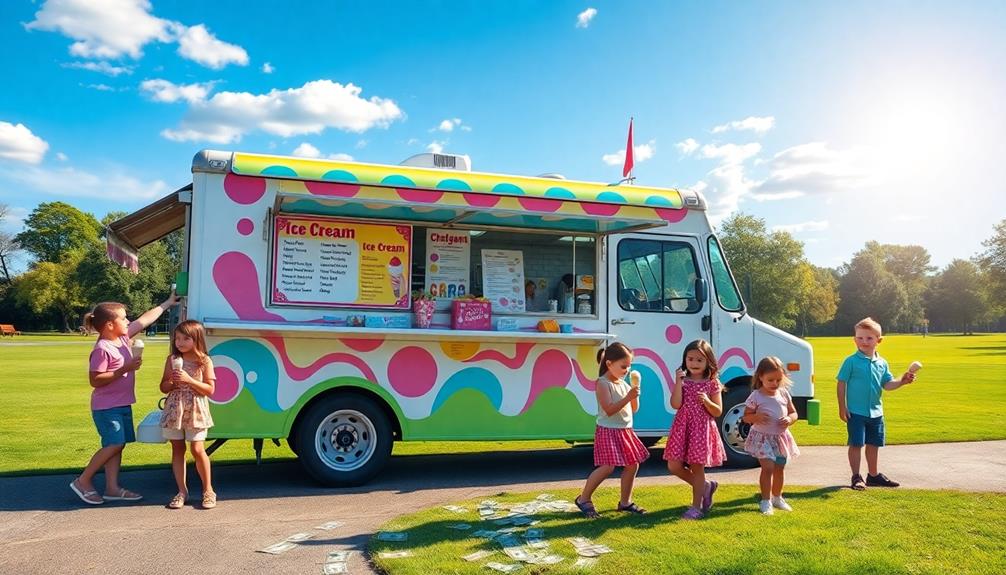
Running an ice cream truck business can be a rewarding venture, especially if you enjoy working outdoors and interacting with customers. This seasonal business typically operates for about 4-5 months a year, allowing you to earn supplemental income ranging from $10,000 to $15,000 annually.
With flexible schedules, you can maximize your earnings, averaging between $200 and $300 daily, and even hitting $1,000 on holidays.
However, it's crucial to reflect on the initial investment costs, which can range from $50,000 to $150,000. This amount includes your truck purchase, equipment, inventory, permits, and insurance.
Once you're up and running, monthly expenses are estimated at around $2,500. These operating expenses cover fuel, maintenance, permits, and restocking inventory.
Despite these costs, the profit margins in the ice cream truck business are appealing. With a gross profit margin typically between 67% and 75%, you can enjoy significant net profits after covering your expenses.
Understanding these financial aspects will help you navigate the ice cream truck business efficiently, ensuring a successful and enjoyable venture.
Initial Investment Breakdown
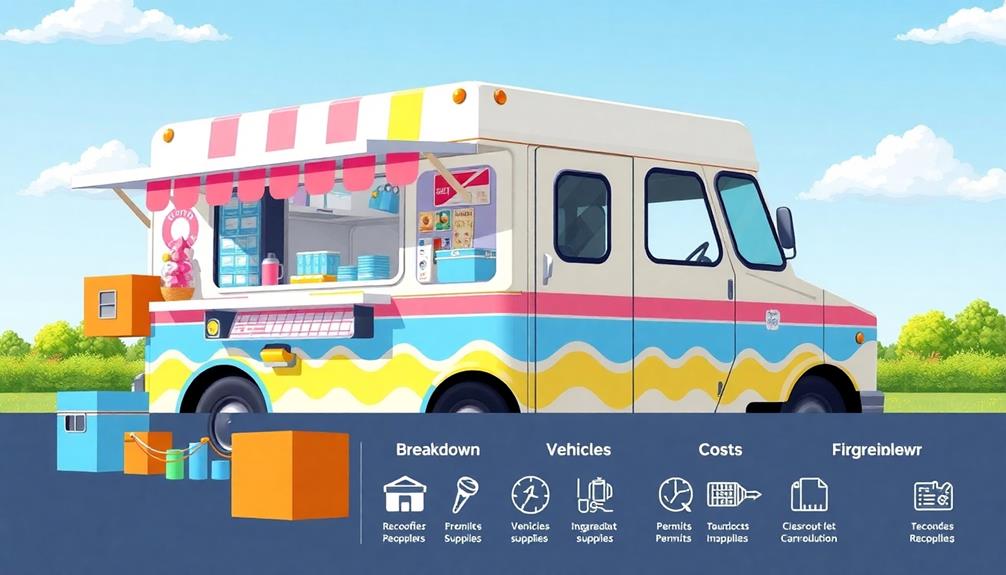
When starting an ice cream truck business, the initial investment can vary considerably based on several key factors.
First, you'll need to decide between a used ice cream truck, which typically costs between $10,000 and $20,000, or a new one, ranging from $50,000 to $100,000.
Next, consider your initial inventory costs for ice cream and supplies, estimated at $2,000 to $5,000, depending on your offerings.
Equipment costs are another significant expense; for freezers and cash registers, you might spend between $5,000 and $10,000, with additional costs for ice cream makers ranging from $3,000 to $10,000.
Don't overlook the permits and licenses necessary for operation, which can vary from $500 to $5,000 based on local regulations.
Lastly, you'll need to factor in annual insurance expenses, which typically fall between $1,000 and $2,000 for commercial auto insurance and liability coverage.
A solid business plan will help you map out these costs and guarantee you're financially prepared for this exciting venture.
Revenue Potential and Earnings

When running an ice cream truck, daily earnings can fluctuate, with typical days bringing in about $300 and special events potentially exceeding $1,000.
You'll also need to take into account the seasonal ups and downs, as summer can skyrocket your income while winter may leave you with less than $200.
Catering opportunities can further enhance your revenue, offering significant earnings depending on the size of the event.
Daily Earnings Overview
The daily earnings of an ice cream truck can vary greatly, offering operators a lucrative opportunity. You can expect to earn between $200 to $300 on average each day, but during peak seasons and holidays, you might see your earnings soar up to $1,000.
This variability in daily earnings can greatly impact your monthly income, which typically averages around $5,000 when you work about 20 days a month. In peak seasons, it's not uncommon for earnings to exceed $10,000 per month, heavily influenced by factors like location, weather conditions, and competition.
Catering events also present a fantastic chance to boost your earnings, with potential income ranging from $300 to $3,500 per event. During major holidays, sales can peak at around $1,000.
Ultimately, while the average annual salary for ice cream truck operators is estimated at $60,000, your net profit after expenses will likely hover around $30,000. By strategically maneuvering through peak seasons and maximizing catering opportunities, you can greatly enhance your daily earnings and overall profitability in this delightful business.
Seasonal Income Variability
Seasonal income variability plays an essential role in determining the overall profitability of your ice cream truck business. Typically, you'll operate for 4-5 months a year, with your earnings peaking during the summer months.
Daily earnings can range from $200 to $300, but on holidays and during community events, those numbers can spike to $1,000, showcasing the potential for significant income fluctuations.
While summer sales can reach up to $700 daily, winter sales might drop below $200. This stark contrast emphasizes the need to plan for the slow months.
Your average monthly earnings might hover around $5,000, but this can vary widely depending on local events, competition, and even weather conditions.
To enhance your revenue, consider catering events, which can yield between $300 to $3,500 per occasion.
Catering Opportunities Potential
Catering opportunities can greatly enhance your ice cream truck's revenue potential, especially during peak seasons. Catering events can generate notable earnings, ranging from $300 to $3,500 per event depending on the size and nature of the occasion.
Major holidays and community events can lead to peak sales, with individual event earnings potentially exceeding $1,000. During peak catering seasons, you can expect to earn over $10,000 thanks to increased demand for your ice cream truck at parties and festivals.
To maximize your profitability, consider establishing partnerships with local businesses and event planners. These partnerships can lead to recurring catering gigs, ensuring a steady flow of income.
Offering special packages or customizable menus can also attract more customers to your services. By tailoring your offerings to fit the specific needs of each event, you not only enhance your revenue opportunities but also create memorable experiences for your clients.
To conclude, focusing on catering events can greatly boost your ice cream truck's earnings and overall success in the competitive market.
Operational Costs and Expenses
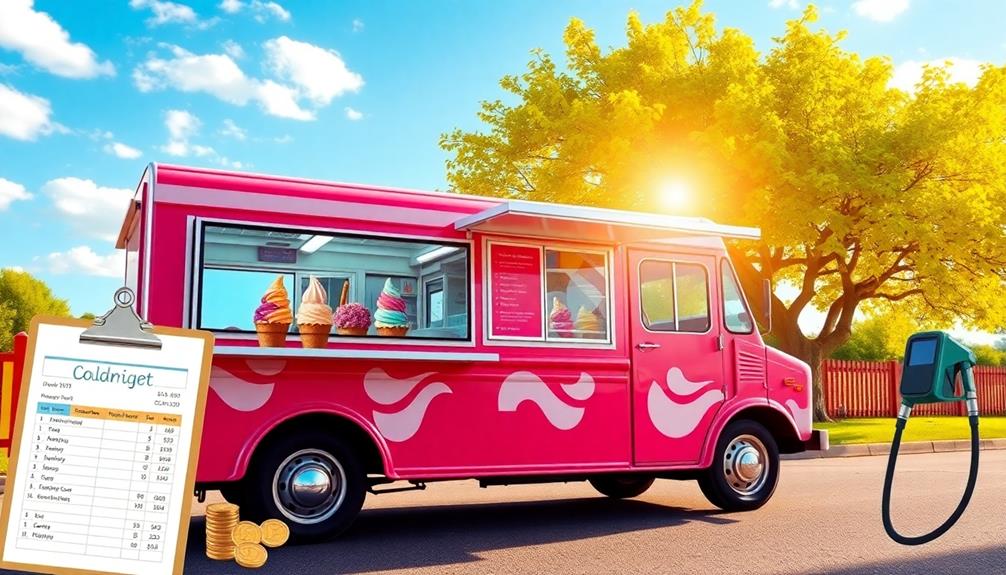
Running an ice cream truck involves maneuvering various operational costs that can quickly add up. When you engage in the business, you'll find that the average monthly expenses hover around $2,500. This amount includes fuel costs, maintenance, and insurance costs, all of which play a vital role in your bottom line.
Fuel costs, for instance, can reach about $5 per hour of operation, fluctuating with gas prices, especially during peak seasons. Your initial inventory is another significant expense, typically ranging from $2,000 to $5,000 based on the variety and quantity of ice cream and related products you choose to stock. It's important to keep your inventory fresh and appealing to customers.
Ongoing costs for maintenance are imperative as well. Regular upkeep guarantees your truck remains operational and meets food safety standards, preventing costly disruptions. Additionally, don't overlook insurance expenses, which can vary from $1,000 to $2,000 annually depending on coverage and local regulations.
Licensing and Permit Requirements
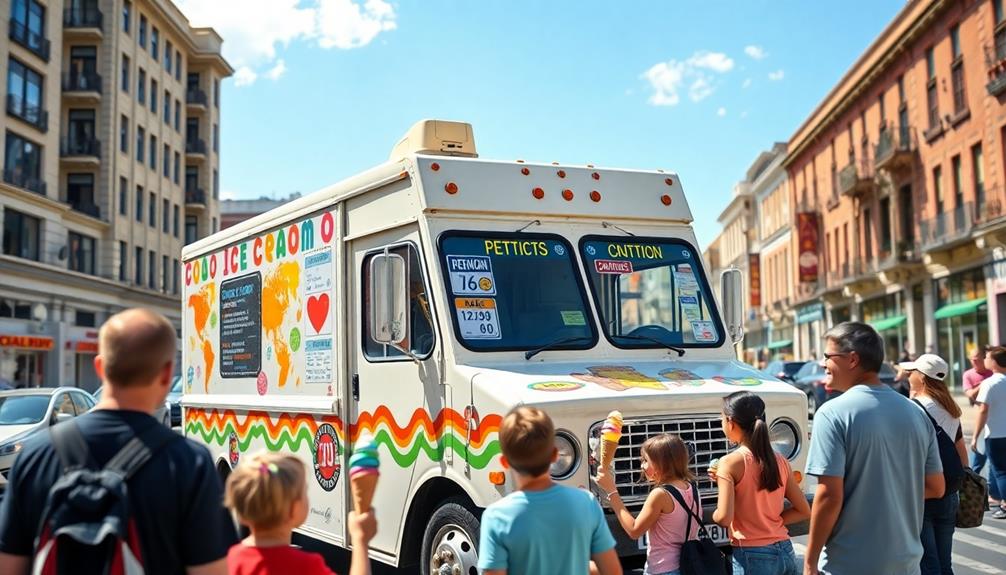
When you start your ice cream truck business, understanding licensing and permit requirements is key.
You'll need a valid driver's license, a health permit to comply with food safety standards, and possibly additional permits depending on your location.
Make sure you research these essentials to avoid fines and keep your business running smoothly.
Required Licenses Overview
Frequently, aspiring ice cream truck operators overlook the importance of obtaining the necessary licenses and permits. Without these, you risk facing legal issues that could derail your business.
Here's a quick overview of what you'll need to stay compliant:
- Business License: Most jurisdictions require this to legally sell products. Check your local regulations for specific requirements.
- Peddler's Permit: If you plan to sell in public spaces, this permit might be necessary to regulate street vending activities.
- Resale Permit: Required for purchasing wholesale products, this guarantees you can buy ice cream and supplies without tax implications.
Additionally, remember that a valid driver's license is essential for operating your truck, and if you're using a larger vehicle, a commercial license may be required.
Each of these licenses and permits plays a critical role in guaranteeing compliance with local laws and health regulations. Taking the time to research and secure these items won't only keep you legal but also help your ice cream business thrive in a competitive market.
Health Permit Essentials
Securing a health permit is an imperative step in launching your ice cream truck business, as it guarantees you meet local food safety regulations. Typically issued by the county health department, this permit guarantees that your operation adheres to necessary sanitation standards.
Depending on your location and specific requirements, the cost of obtaining a health permit can range from $100 to $1,000.
To get your health permit, you'll likely need to pass an inspection. This inspection verifies that your truck complies with proper food storage and handling procedures. Remember, maintaining these standards is vital not just for obtaining your permit but for keeping it.
Most jurisdictions require regular renewals of health permits. Some may ask for annual renewals, while others might've different timelines. Be sure to stay on top of these deadlines to avoid any disruptions in your business.
Failing to obtain or renew your health permit can lead to hefty fines or even suspension of your operations. This not only impacts your revenue but can also tarnish your reputation in the community.
Insurance Coverage Necessities
Insurance coverage is an essential component of operating an ice cream truck business.
You'll need to protect yourself against potential liabilities and losses, which means investing in commercial auto and product liability insurance. This coverage not only safeguards your vehicle but also guarantees you're covered if a customer faces any issues with the products you sell.
Before you hit the road, make certain you have the right permits and licenses in place.
Here's what you'll need:
- Business license: Required by your local municipality to legally operate your business.
- Health permit: Obtained from the county health department to guarantee you meet food safety standards.
- Peddler's permit: Necessary for selling in public spaces, depending on local regulations.
Additionally, if you're operating a larger vehicle, a commercial driver's license might be necessary.
Don't forget that a resale permit can be vital for purchasing wholesale products.
Taking these steps guarantees that you're compliant and prepared to serve your delicious ice cream while minimizing risks associated with your business.
Importance of Insurance Coverage
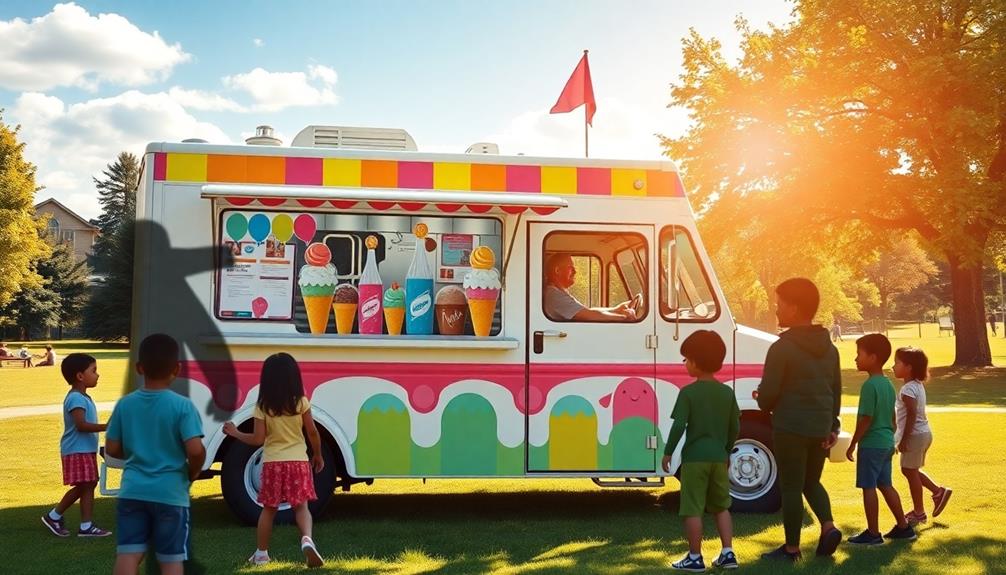
Running an ice cream truck business comes with its fair share of risks, making insurance coverage an essential aspect of your operation. You need to protect yourself against various liabilities, and that's where commercial auto insurance comes in. It covers your truck from damage due to accidents, theft, or natural disasters, guaranteeing you're not left in a financial bind.
Product liability insurance is equally important. It safeguards you against claims of customer illness or injury from the products you sell, which is fundamental for maintaining customer trust.
If you're hiring employees, workers' compensation insurance becomes necessary, covering medical costs and disability for work-related injuries, as required by law in most jurisdictions.
Additionally, professional liability insurance provides thorough protection against property damage, medical expenses, and negligence claims.
Regularly reviewing and customizing your insurance policies guarantees they meet your evolving business needs and comply with local regulations. By prioritizing insurance coverage, you not only protect your assets but also build a solid foundation of trust with your customers, allowing your ice cream truck business to thrive.
Marketing Strategies for Success
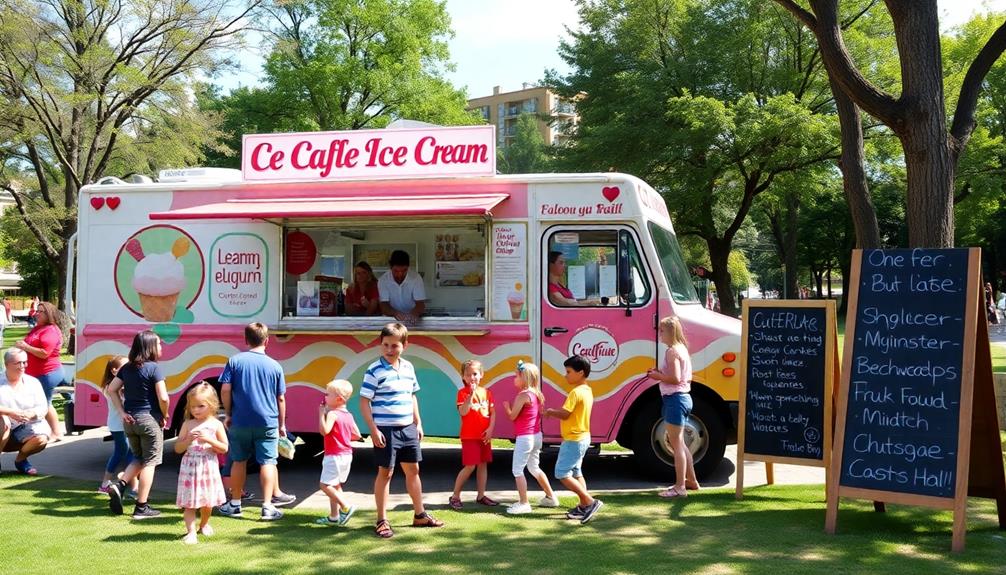
To make your ice cream truck a hit, you need effective marketing strategies that catch attention and drive sales.
Focus on social media promotion to keep customers updated on your daily routes and special offers, while optimizing your route to reach the most foot traffic.
Don't overlook local advertising methods, like flyers and partnerships with community events, to create buzz and build a loyal customer base.
Social Media Promotion
Harnessing the power of social media can markedly enhance your ice cream truck's visibility and customer engagement. Establishing a strong social media presence on platforms like Facebook and Instagram is essential for sharing daily routes, special promotions, and connecting with your community.
Here are some strategies to contemplate:
- Post mouth-watering photos of your ice cream offerings to attract followers.
- Share customer testimonials to build trust and encourage sharing, boosting your organic reach.
- Create a unique hashtag for your truck, fostering community and brand loyalty.
Utilizing targeted advertising helps you reach specific demographics, particularly families and children in your area, maximizing customer engagement.
It's important to actively engage with customers by responding to their feedback and encouraging them to share their experiences online. Monitoring social media analytics will allow you to assess engagement levels and adjust your marketing campaigns as needed.
Route Optimization Techniques
Optimizing your ice cream truck's route is essential for maximizing sales and efficiency. Start by using Google Maps to study local neighborhoods, focusing on areas with high child populations and low traffic. Strategic parking in these zones can considerably boost sales.
Be sure to research local vending ordinances to identify permissible locations; avoiding fines keeps your operation smooth and compliant.
Engaging with other ice cream truck drivers can also provide valuable insights into profitable routes. By sharing information, you can avoid overlapping areas and create a cooperative competitive environment.
Keep an eye on community events and seasonal festivals, as these gatherings can profoundly increase foot traffic. Parking near high-traffic areas during such events can lead to a surge in sales.
Regularly analyze your sales data to adjust routes based on customer demand and preferences. By aligning your stops with peak sales times and locations, you'll guarantee that you're always where the customers are.
Implementing these route optimization techniques will help you not only meet but exceed your sales goals, making your ice cream truck a sweet success.
Local Advertising Methods
Effective local advertising methods can greatly enhance your ice cream truck's visibility and sales. Understanding local laws is vital to guarantee your advertising strategies comply with regulations.
Begin by conducting market research to identify your target audience and the best channels to reach them. Consider incorporating unique promotional events, similar to unique party options that can create memorable experiences for your customers.
Consider these impactful strategies:
- Participate in local events: Join fairs and festivals to directly engage with the community, boosting brand recognition and immediate sales.
- Collaborate with local businesses: Cross-promotions can attract customers to both your truck and their stores, enhancing foot traffic and fostering a customer loyalty program.
- Utilize local publications: Advertise in community newsletters and publications to reach engaged audiences effectively and cost-efficiently.
Additionally, eye-catching flyers and banners can help you highlight special offers or seasonal flavors.
These visual aids are great for residential neighborhoods where families and children can easily spot them.
Seasonal Sales Variability
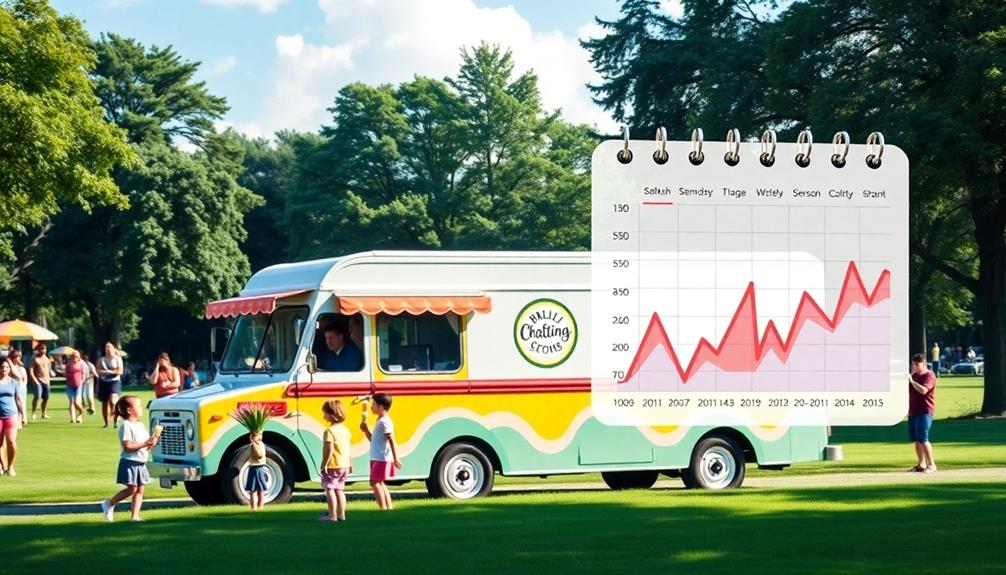
Seasonal sales variability plays an essential role in the economics of running an ice cream truck.
You'll notice that your earnings can skyrocket during peak seasons, especially in summer when daily sales can reach $700. However, as colder weather rolls in, your sales might drop below $200, limiting your operating months to just 4-5 per year. This seasonality greatly impacts your annual revenue potential.
During peak seasons, you could see monthly earnings exceed $10,000, driven by the surge in customer demand and favorable weather patterns.
Special holidays and community events can also provide unexpected boosts, with daily earnings climbing to $1,000 during notable occasions. To capitalize on these opportunities, understanding local weather patterns and community events is essential.
Customer Engagement Techniques
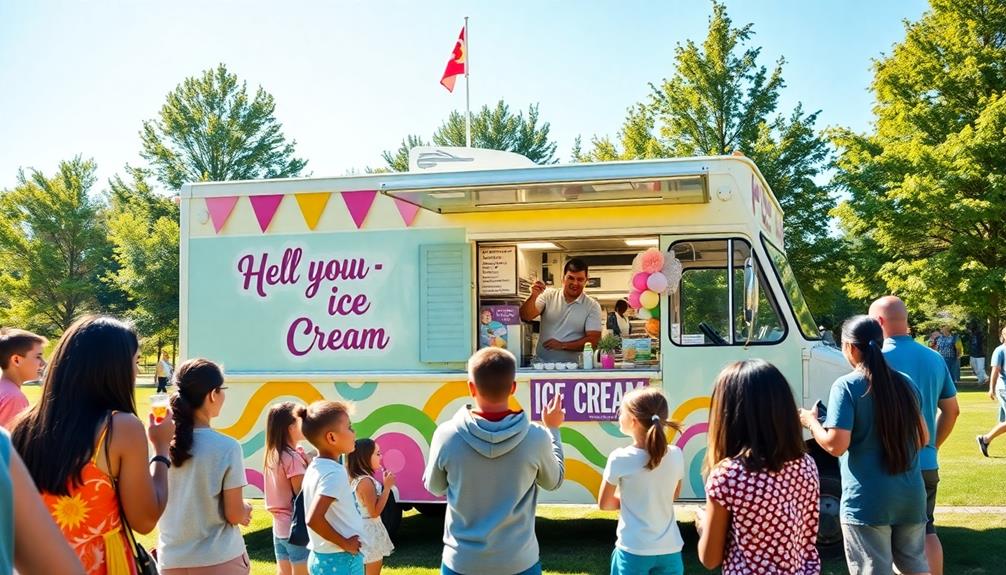
Engaging your customers is key to driving repeat business and boosting sales for your ice cream truck. One effective way to foster customer loyalty is by implementing a customer loyalty program. This encourages customers to return and increases overall sales.
You can also utilize social media platforms to provide real-time updates on your truck's location and ongoing promotions, creating a sense of community around your brand.
Here are three effective customer engagement techniques:
- Promotions & Discounts: Offer special promotions, coupons, and discounts to attract new customers and encourage existing ones to purchase more.
- Customer Interaction: Regularly update your followers on your daily routes and special events. This keeps your customers informed and enhances interaction.
- User-Generated Content: Encourage your customers to share their experiences on social media. This generates organic marketing and boosts your brand visibility.
Resources for Entrepreneurs
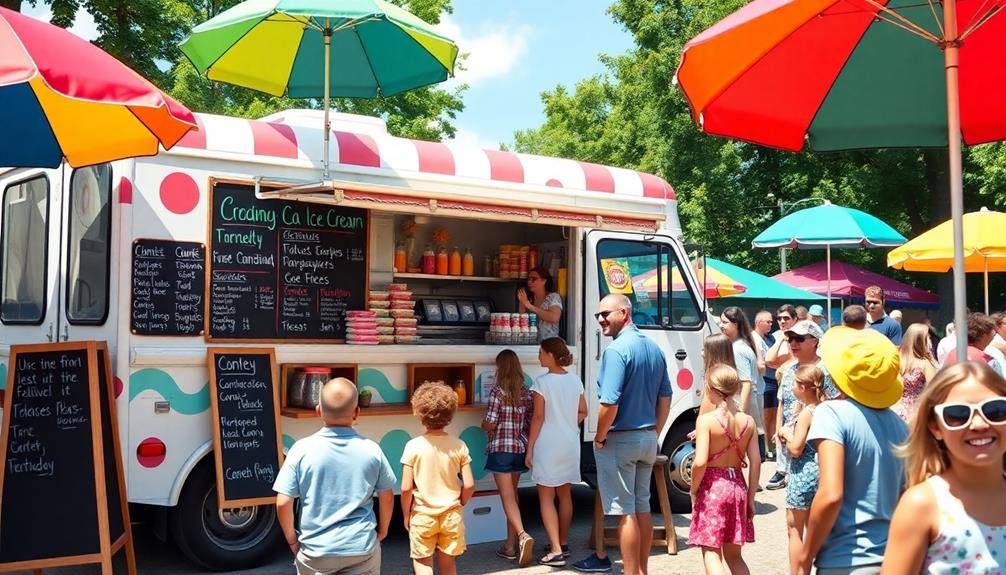
Starting your ice cream truck business requires access to the right resources to set yourself up for success. First, explore platforms like AllScream for valuable information and connections to local vendors, which can enhance your operational knowledge.
When it comes to purchasing your vehicle, check out Used Vending and eBay Listings for a range of used trucks priced between $10,000 and $20,000, making it easier to find an affordable option.
To equip your truck efficiently, visit Turn Key Parlor, an online superstore for all the essential ice cream equipment you'll need. Additionally, you can't overlook the importance of obtaining the necessary permits and licenses. Utilize your local chamber of commerce resources to gather critical information on regulations specific to your area.
Lastly, consider joining the SCORE network for mentoring and workshops tailored for small business owners. These invaluable sessions can help you navigate challenges and develop effective strategies for running your ice cream truck business.
Frequently Asked Questions
Is Owning an Ice Cream Truck Profitable?
Owning an ice cream truck can be profitable if you manage it well. With good sales strategies and seasonal operations, you can see healthy returns, especially during holidays and events that boost your income considerably.
Is an Ice Cream Business Profitable?
Imagine a garden of sweet possibilities; an ice cream business can flourish. With creativity and strategy, you'll find profits blooming in summer's warmth, though winter's chill may test your resolve. Plan wisely, and success awaits.
How Much Does It Cost to Invest in an Ice Cream Truck?
Investing in an ice cream truck typically costs between $10,000 to $20,000 for a used truck. You'll also need around $2,000 to $5,000 for inventory and additional equipment costs, plus permits and insurance.
How Much Can You Earn With an Ice Cream Van?
Running an ice cream van's like sailing into a sea of opportunity. You can earn between $200 to $300 daily, and during peak times, you might even reel in over $10,000 monthly—if you're dedicated.
Conclusion
As you steer your ice cream truck through sun-drenched streets, the laughter of children and the sweet melody of jingles fill the air. Your journey isn't just about serving treats; it's about crafting memories. With careful planning and a scoop of creativity, you can turn those sunny days into a thriving venture. So, embrace the hustle, sprinkle in some marketing magic, and watch your dreams swirl into reality, one cone at a time.
